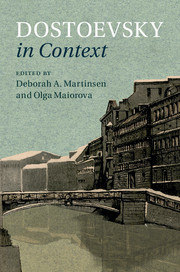Book contents
- Frontmatter
- Contents
- List of illustrations
- Notes on contributors
- Acknowledgments
- Note on citation, transliteration, glossary, and dates
- Chronology
- 1 Introduction: the many worlds of Dostoevsky
- PART I SOCIAL, HISTORICAL, AND CULTURAL CONTEXTS
- i CHANGING POLITICAL, ECONOMIC, AND SOCIAL LANDSCAPE
- 2 The Great Reforms and the new courts
- 3 The abolition of serfdom
- 4 Punishment and crime
- 5 Socialism, utopia, and myth
- 6 Nihilism and terrorism
- 7 The “woman question,” women's work, women's options
- 8 The economy and the print market
- ii POLITICAL, SOCIAL, AND CULTURAL INSTITUTIONS
- iii SPACE AND PLACE
- iv RELIGION AND MODERNITY
- PART II LITERATURE, JOURNALISM, AND LANGUAGES
- Glossary
- Further reading
- Index
- References
4 - Punishment and crime
from i - CHANGING POLITICAL, ECONOMIC, AND SOCIAL LANDSCAPE
Published online by Cambridge University Press: 18 December 2015
- Frontmatter
- Contents
- List of illustrations
- Notes on contributors
- Acknowledgments
- Note on citation, transliteration, glossary, and dates
- Chronology
- 1 Introduction: the many worlds of Dostoevsky
- PART I SOCIAL, HISTORICAL, AND CULTURAL CONTEXTS
- i CHANGING POLITICAL, ECONOMIC, AND SOCIAL LANDSCAPE
- 2 The Great Reforms and the new courts
- 3 The abolition of serfdom
- 4 Punishment and crime
- 5 Socialism, utopia, and myth
- 6 Nihilism and terrorism
- 7 The “woman question,” women's work, women's options
- 8 The economy and the print market
- ii POLITICAL, SOCIAL, AND CULTURAL INSTITUTIONS
- iii SPACE AND PLACE
- iv RELIGION AND MODERNITY
- PART II LITERATURE, JOURNALISM, AND LANGUAGES
- Glossary
- Further reading
- Index
- References
Summary
The last two decades of Dostoevsky's life, when he wrote his most influential works, coincided with significant changes in the Russian penal system. While penal reforms were not as radical or as comprehensive as some of the other Great Reforms of the 1860s, such as the abolition of serfdom (1861) or the court reform (1864), they thrust questions regarding the efficacy and morality of state punishment to the center of public consciousness.
Condemned to death for participating in the Petrashevsky circle*, Dostoevsky had first-hand experience of the Russian penal system. His status as a political criminal did not entitle him to significantly different treatment, but it made him vulnerable to capital punishment, a verdict that was later commuted to a sentence of hard labor. Dostoevsky knew what it felt like to live through a mock execution, to spend months in solitary confinement and years in communal prison quarters for common criminals, to witness corporal punishment from perilous proximity, and to be nearly whipped himself. Upon returning from close to a decade of hard labor and exile in Siberia (1850–9), Dostoevsky was thus well prepared to enter widespread public debates about the practice and theory of punishment in Russia and the West.
When Ivan Karamazov asks his devil what sorts of torments, besides the “quadrillion kilometers,” exist in the other world, the devil replies: “What other torments? Ah, don't even ask: before it was one thing and another, but now it's mostly the moral sort, ‘remorse of conscience’ and all that nonsense. That also started because of you, from the ‘mellowing of your mores’” (15:78; Bk. 11, Ch. 9). The quotation marks around “mellowing of your mores” and “remorse of conscience” indicate both the devil's irony and Dostoevsky's assumption that the idioms would be familiar to his readers. Indeed, both phrases were rhetorical staples in overviews of Western penal history that, from the late 1850s onward, regularly appeared in the Russian press. “Remorse of conscience” was often associated with the new institution of the penitentiary which, in contrast to the old gaol, aspired to enact deep changes in the criminal's moral character. “Mellowing of the mores” described the general direction of Western penal politics viewed approvingly by liberally inclined, West-oriented Russian commentators.
- Type
- Chapter
- Information
- Dostoevsky in Context , pp. 30 - 38Publisher: Cambridge University PressPrint publication year: 2016



